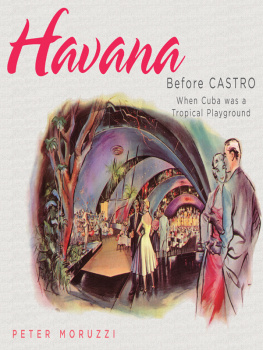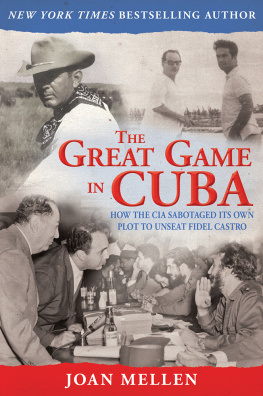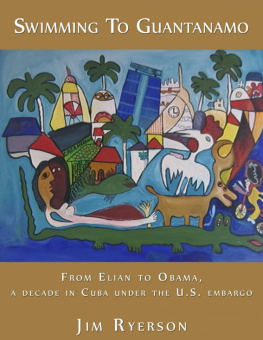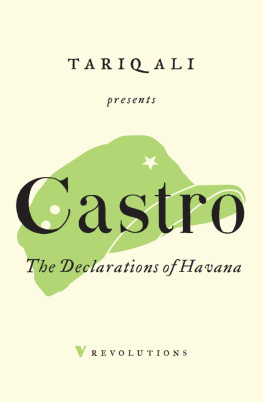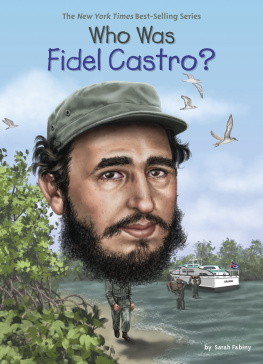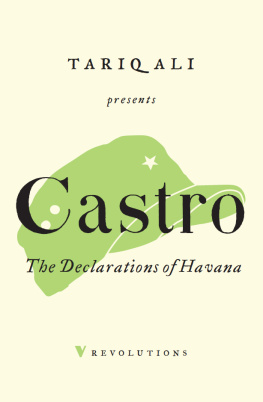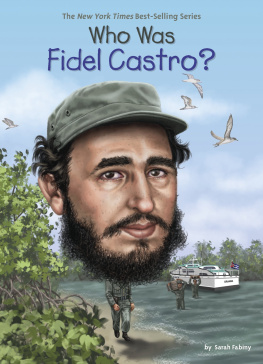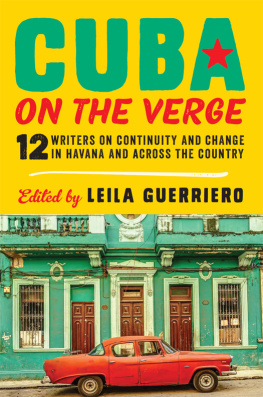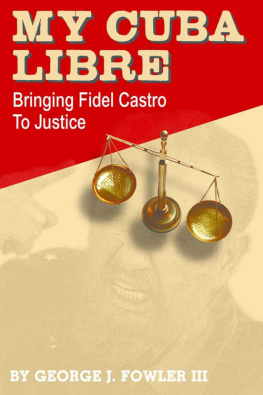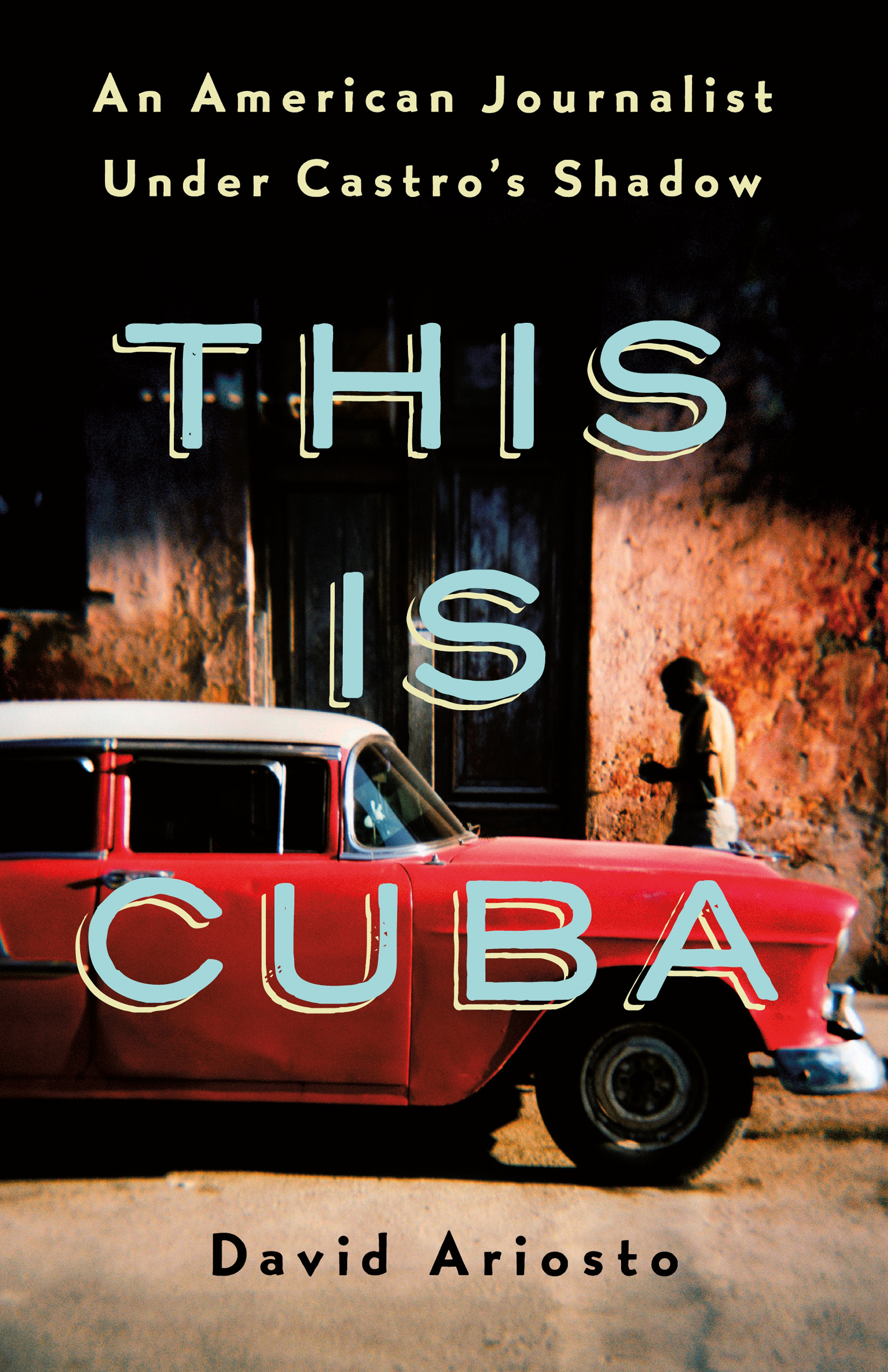Contents
Guide
Pagebreaks of the print version

The author and publisher have provided this e-book to you for your personal use only. You may not make this e-book publicly available in any way. Copyright infringement is against the law. If you believe the copy of this e-book you are reading infringes on the authors copyright, please notify the publisher at: us.macmillanusa.com/piracy.
To Steph, Bel, Elizabeth, Mom, and Dad
This book encapsulates nine years of reporting on Cuba, a year and a half of which I spent living and working as a photojournalist in Havana. It is based on my own story and the stories of others, drawing on a mix of interviews, memories, and experiences meant to elicit a better understanding of a nation that has so often captured imaginations and been thrustor has thrust itselfonto the global stage. While officials cited in this book are usually identified by their full names, in some cases I use only the first names of people who expressed concerns for their own safety and well-being. In keeping with the Cuban tradition, I also refer to former presidents Fidel Castro and Raul Castro on second reference by their first names, Fidel and Raul, respectively.
This book is not intended to be a comprehensive portrayal of the island in all its facets and complexities but rather a glimpse of Cuba through my own eyes, a once-nave American journalist who, after years of reporting on and about the island, has hopefully wised up at least a bit.
This is Cuba .
I sipped an amber rum. Habana Club. Seven years. No ice. He palmed a Bucanero beer, half wrapped in a flimsy white paper napkin. Curls of Cohiba smoke wafted between us, giving the room a translucent look and an acrid taste. Castro was having a drink. And so was I. It was a Friday evening in late November 2010, and we were ensconced on opposite ends of a small subterranean saloon on the western outskirts of Havana. It was my last night in Cuba.
Jammed in the crevices of my back pocket was a one-way ticket to Miami, scheduled for the following morning, the first leg of a connecting flight to New York City. For the past year and a half, Havana had been home during my stint as a photojournalist for CNN on an island still forbidden to most Americans. But now I was ready to leaveforever, I thought. My father, who lived in the pinelands of southern New Jersey, had been sick following acute kidney failure, which punctuated my own recognition that life in Castros Cuba didnt much suit me anymore. So I had found a job as an editor in New York, exchanged my house on the Caribbean for a studio apartment on Manhattans Upper East Side, and traded the guayabera for a suit and tie; Cuban heat for a wintry chill. Crazy, it seemed, but Gotham was beckoning.
Then again, this was my last night in Havana. Better make the most of it.
Do you know who that is? whispered Antonina, a server in La Fontana, the private, family-run restaurant, or paladar, to which that smoky bar was attached.
No, I replied. Who?
There was usually a breezy familiarity in the way she spoke, imbued with a Caribbean warmth and that marbles-in-your-mouth accent for which much of Cuba is known. The banter was usually light. The topics rarely serious.
But tonight was different. Antonina seemed different, the burden of her words a bit heavier than usual. Inside that paladar, a steady crop of regulars had shuffled in. Rum and cigars, coupled with a live singer or guitarist, usually helped to lighten the mood. But tonight, a palpable tension gripped the air. And the staff seemed to feel it. It was a sensation to which many had grown accustomed.
Situated on a leafy street a few blocks from Havanas rocky northern coast, La Fontana had opened in 1995 when authorities still investigated private restaurants for their numbers of tables and chairs (more than twelve could provoke a raid). Its clandestine feelthere was no sign outside and a surrounding stone wall all but hid the restaurant from viewwas part of a broader bid for its very survival. And it looked it. The Castro government had almost never regarded privatization kindly, granting business licenses only when economic forces compelled a drip of liberalizing reform. But in the aftermath of the Soviet collapse, a financial crisis had ensued. For decades, Cuba had relied on subsidies from Moscow. In their absence, it teetered on the brink of collapse. Absent his old Kremlin ally, Fidel looked inward for answers and reluctantly allowed a few private restaurants to surface in a fraught attempt to gin up local commerce. La Fontanas two owners, Horacio Reyes-Lovio and Ernesto Blanco, were among the beneficiaries of the new tone and would soon become successful restaurateursa dangerous prospect on an island dominated by Communist hard-liners who had spent their careers fending off yanqui capitalists. New concentrations of wealth were forming that could undermine the Revolution. So the two businessmen kept their profiles low and were quietly, if not begrudgingly, allowed to thrive. Perhaps even government officials were loath to shut down one of the few haunts where they could still score a decent meal.
By the time I arrived in Havana, in June 2009, that old paladar had been transformed into a favorite hangout for politicians, their staffs, and foreign businesspeople alike. It was a place to eat, drink, andin my casewrite, mostly from the vantage point of a still somewhat nave American journalist. A fixture there, Id often scratch out pages alone atop one of the few polished wooden tables in back, filling a leather-bound notebook with run-on sentences, notes, and smears of blue ink. They were random observations, mostly. A sort of blind attempt to piece together this confounding puzzle of a nation that I now called home. His approach. Her look. Their meeting. A dribble of insight that seeped through the censors of state-run newspapers.
After a few months and what amounted to a few notebooks full of mostly useless pages, I had gotten to know the restaurants staff. One was Antonina, whose frankness and sharp tongue seemed matched only by her curiosity. It was the former that made us friends and the latter that would drive her to leave the island as a refugee. But before she did, her occasional rum-topped whispers would help fill in my own knowledge gaps, chasms really, when it came to Cuba. Men like Ricardo Alarcon, then president of Cubas National Assembly, were among La Fontanas well-heeled patrons who often chatted and sipped mojitos with a hardy crop of familiar faces. Id try without much luck to listen in, attempting to discern with whom he was meeting and what they were discussing. Business could be conducted this way, and the eavesdropping went both ways.
But tonight, my last night, I wondered why Antonina was so serious and to whom she had so subtly pointed. Passing behind me with a tray of empty glasses, she leaned into my ear.
Thats Alejandro, she whispered, brushing back the unkempt strands of raven-colored hair that dropped in front of her face.
By Alejandro, Antonina had meant Alejandro Castro Espn, a colonel within Cubas powerful Interior Ministry and a member of the Castro family, whose inherited importance seemed to be outpacing much of the rest of the Castro clans. It was President Raul Castros only son who now sat across from me at the bar. How could I not have realized that before? Of course, in November 2010, the extent of Alejandros importance was not yet clear. He had yet to broker secret deals in Ottawa and Toronto with top Obama advisers Ben Rhodes and Ricardo Ziga, nor had he presided over a spy-for-spy negotiation that would lay the groundwork for dtente. What was clear was that Alejandro was already a player and a de facto top adviser to his father. More importantly, he was rumored to be gaining in power atop the senior echelons of the very agency tasked with Cubas surveillance and counterintelligence; his ministry spied on journalists and dissidents alike. And by apparent coincidence, in my final hours in Cuba he sat across from me, slouched over a beer.


